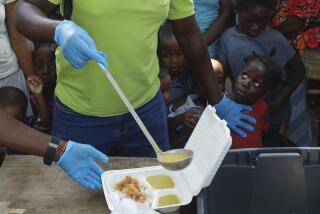In Haiti, sexual violence, healthcare neglect plague women, girls
- Share via
Reporting from Mexico City — Nearly 20 months after Haiti’s devastating earthquake, women and girls have been badly neglected in recovery efforts, subjected to sexual violence and left without access to obstetric care even as they give birth to scores of babies in squalid tent cities, human rights activists say.
Despite a mammoth humanitarian-care push in the wake of the Jan. 12, 2010, quake that killed as many as 300,000 people, serious gaps exist in the healthcare that women and girls are receiving, according to a report released Tuesday by the New York-based Human Rights Watch.
Pregnant women reported having to give birth in alleyways or on floors; being unable to afford transportation to hospitals, and not having access to prenatal care.
Human Rights Watch also documented widespread sexual violence and “transactional sex,” where women trade sex for food or other basic survival needs. Three girls, ages 14 and 15, and three women interviewed by the organization had become pregnant through rape but had been too fearful or too ashamed to seek help.
The 78-page Human Rights Watch report is entitled “Nobody Remembers Us.”
“It is inconceivable that, 18 months after the quake, with so much money pledged … that women and girls are giving birth in muddy tents,” Amanda Klasing, the report’s main author and a fellow in the group’s women’s rights division, said in a telephone interview from Port-au-Prince, the Haitian capital.
Most Haitians face extraordinary hardships even today. More than half a million continue to live in ramshackle collections of tents with minimal sanitation. Food and jobs are scarce, a cholera epidemic persists and street violence is on the rise.
It’s worse for women, largely excluded from the reconstruction process despite their importance to the informal economy, the report’s authors said. In a country already beset by the highest maternal mortality rate in the Western Hemisphere before the quake, women and girls face unwanted pregnancies, unhealthy conditions for their children, a lack of access to education, poverty and the risk of eviction from already precarious living quarters. Heavy rains this time of year also add to the woes by flooding tents and spreading filth. Very little post-rape care has been made available to the majority of female victims.
“The earthquake has exacerbated the vulnerabilities of this already vulnerable group,” the report says.
Klasing said resorting to “survival sex” by women had become common. Women trade sex for food as a way to provide for themselves and their families. “You have to eat,” a woman named Gheslaine, who lives in the crowded Croix-des-Bouquets camp outside Port-au-Prince, told the investigators.
Tragically, Klasing said, the women’s lack of access to healthcare comes despite numerous international programs that exist in Port-Au-Prince which could help. The Haitian government has failed to distribute information about available care to females in the camps and has failed to protect them, the report says.
The group noted that of $5.3 billion pledged by international donors after the quake, $258 million was dedicated to healthcare — of which only $118.4 million has been disbursed.
“For all women and girls in Haiti,” the report concludes, “fulfillment of their rights to reproductive and maternal health and to live free of violence is fundamental to any effort to rebuild their lives after the devastation and disruption caused by the earthquake.”
More Times coverage of the plight of women in Haiti.
More to Read
Sign up for Essential California
The most important California stories and recommendations in your inbox every morning.
You may occasionally receive promotional content from the Los Angeles Times.











